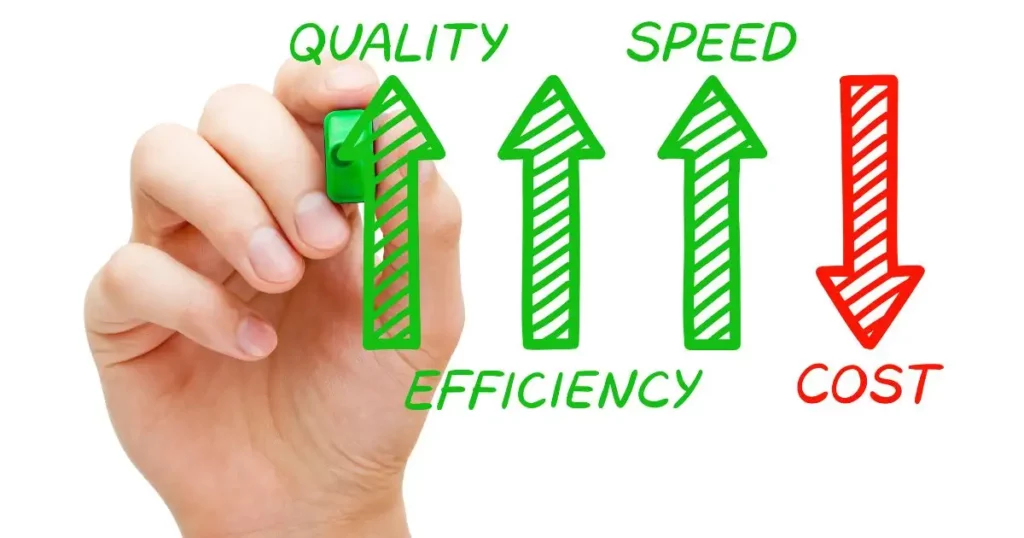The new year is right around the corner, and many companies are already finished with their business growth plan and strategies.
Having a business growth plan for 2024 might seem like an excessive thing to do, especially for a smaller organization starting out, but we are telling you right now: You HAVE to prepare for next year! Having a strategy is essential for business success.
That’s why, in this Team Building Podcast, Jeff shares with us the non-negotiable actions that any business can implement for 2024 success. Are you ready to take your business to new heights?
Why You Need a Business Growth Plan
If you find yourself in a position where your business’s direction seems unclear, or you’re relying on hope rather than strategy for growth, it’s time to pause and change directions. You need an actionable plan to track and grow your business.
A well-structured business growth plan serves as your roadmap to success. It’s a blueprint that outlines your business goals, defines your strategies for achieving these goals, and sets measurable milestones along the way.
Without such a plan, you risk operating in a reactive mode, always playing catch-up with business trends and competitors.

The First Step of a Business Growth Plan: Set Goals
Before you can start making changes, it’s crucial to understand what success looks like for your business.
What exactly do you want to achieve? This might be expanding into new markets, increasing customer retention, or boosting annual revenue by a certain percentage.
Without a crystal-clear vision, your path becomes blurry, and it will be harder to implement the needed changes.
Work Backwards
Once your goals are defined, the next step is to work backward. Yes, we know this sounds strange, but starting from your goal and reverse-engineering will help you define the precise steps you need to take.
For instance, let’s say your goal is to increase your annual revenue by 20% in 2024.
Working backward, you might identify several sub-goals such as improving your marketing strategy to attract more customers, optimizing your sales process to close deals more effectively, or enhancing your product or service to justify a price increase.
By breaking down your primary goal into smaller, achievable tasks, it becomes less daunting and more manageable.
Remember, the journey of a thousand miles begins with a single step. By setting clear goals and outlining the steps to achieve them, you’re already well on your way.
Study the Market for a Winning Business Growth Path
Being inquisitive and studying your competitors are key traits of successful entrepreneurs.
What strategies are they employing that are yielding success? How have they positioned their product or service in the market? What channels are they using to reach their customers?
And more importantly, can you successfully implement some of those strategies in your business?
Understand the principles that make other strategies effective. This will allow you to adapt these strategies to suit your business’s unique needs and circumstances.
The Power of Dream Boards in Your Business Growth Plan 2024
We have said this before, and we will say it again: Dream boards are the key to your team’s success in 2024.
What is a Dream Board?
A dream board is essentially a visual portrayal of you or your team’s desired future. It’s a collage of images, words, or symbols that represent the ultimate goal.
These could be anything from professional milestones like landing a major client to personal aspirations such as buying a new home or taking a dream vacation.
The magic of a dream board lies in its ability to make your team’s goals tangible and vivid. By giving them a clear image of what they’re working towards, it can inspire motivation, boost morale, and foster a sense of shared purpose.

Implementing a Dream Board
So, how do you get your team on board? Start by asking your team members what they hope to achieve in 2024. Encourage them to think broadly and consider both their professional and personal aspirations.
Next, have them represent these goals visually. This could involve cutting out pictures from magazines, drawing, printing images from the internet, or even writing down powerful affirmations; make it fun!
The goal is to create a vibrant and inspiring collage that resonates with each team member and becomes personal to their desires.
Aligning Dream Boards with Key Performance Indicators (KPIs)
While dream boards are a great motivational tool, it’s essential to ground them in reality through measurable KPIs.
Establish KPIs for 2024 that align with the dreams depicted on the board. For instance, if a team member’s goal is to buy a new home, a related KPI might be increasing their sales by a certain percentage.
By linking KPIs to dreams, team members can see a clear path from their current situation to their desired future.
It also provides a way to track progress by making smaller, more achievable goals along the journey.

Setting and Tracking KPIs: Keeping Accountable
Goals and a vision board are essential, but how do you measure your team’s progress toward those goals? Are they being effective and proactive?
Keeping your team accountable is a crucial component of any successful business growth plan.
Holding Your Team Accountable
Accountability starts with a clear understanding of each team member’s goals and aspirations.
If a team member seems to be straying from their goals, it’s an opportunity to step in and provide support.
Perhaps their goals have changed, or they’re facing challenges that are hindering their progress. Open dialogues can help identify the issue and allow you to guide them towards a solution.
Keep them accountable by asking what’s going on, finding solutions, and changing their goals if necessary.
Coaching for a Successful Business Growth Plan
As a leader, your role isn’t just to set goals and hold your team accountable—it’s also to coach them toward becoming the best version of themselves.
This involves providing constructive feedback, offering resources for skill development, and encouraging a growth mindset.
Remember, each team member is unique, with their own strengths, weaknesses, and aspirations. Tailored coaching can help them leverage their strengths, overcome their weaknesses, and achieve their personal and professional goals.

The Art of Letting Go
Oftentimes, agents will choose not to follow the path to success, and that’s ok. It’s crucial to respect the autonomy of your team members.
If an agent decides not to utilize the platform or resources you’ve provided, it’s their choice. While it may be disappointing, especially if you believe strongly in the potential benefits, it’s important not to take it personally.
Learning to let go can be challenging, but it’s a necessary part of leadership. Holding on too tightly can create tension, which can affect the team’s overall morale and productivity.
Start Your Business Growth Plan Today
Are you ready to start your business plan for 2024? By following these tips, you will be a step closer to business success.
Stop wasting your time and money on strategies that don’t work. We are ready to help you get your business on track and reach your goals for 2024.
Contact Elite Real Estate Systems today and start seeing the results you want for your business.
































